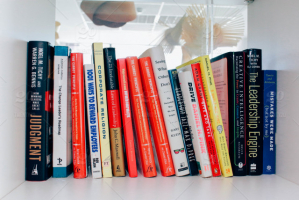Top 10 Best Books On Manufacturing
Manufacturing is a crucial industry that has played a significant role in the development of modern society. To become a successful manufacturing professional, ... read more...one must have a thorough understanding of the industry and its processes. This is where books come in handy. There are countless books on manufacturing available, but it can be challenging to determine which ones are worth reading. In this article, we have compiled a list of the best books on manufacturing that every professional in the industry should read. These books cover various topics, from lean manufacturing to supply chain management, and are written by industry experts who provide valuable insights and strategies.
-
The Lean Six Sigma Pocket Toolbook, written by Michael George, David Rowlands, Mark Price, and John Maxey, is a concise and practical guide that provides readers with essential tools and techniques for successful Lean Six Sigma implementation. It is one of the best books on manufacturing. As a comprehensive reference manual, this pocket-sized book offers over 100 tools and techniques that can be used in any industry, and it is a must-have resource for anyone interested in process improvement.
Michael George is the founder and CEO of George Group, an international management consulting firm that specializes in Lean Six Sigma implementation. He is also the author of several other books on process improvement, including Lean Six Sigma for Service and Lean Six Sigma for Manufacturing. David Rowlands is a senior consultant with George Group and has over 25 years of experience in the field of operations and process improvement. Mark Price and John Maxey are also senior consultants with George Group and have extensive experience in Lean Six Sigma implementation.
In the introduction to the book, the authors explain that the Lean Six Sigma methodology is a powerful approach to process improvement that combines the principles of Lean and Six Sigma. The Lean philosophy focuses on eliminating waste and improving flow, while Six Sigma focuses on reducing variation and improving quality. Together, these two methodologies provide a comprehensive approach to process improvement that can lead to significant cost savings, improved efficiency, and increased customer satisfaction.
The authors go on to explain that the tools and techniques included in this book have been proven to be effective in a wide range of industries, including healthcare, finance, manufacturing, and service. Each tool is described in detail, with step-by-step instructions on how to use it, as well as examples of how it has been used successfully in real-world situations. The book also includes a comprehensive glossary of Lean Six Sigma terms and a quick-reference index for easy navigation.
Overall, The Lean Six Sigma Pocket Toolbook is an indispensable resource for anyone interested in process improvement, and it provides readers with the knowledge and tools they need to successfully implement Lean Six Sigma in their organization.
Author: David Rowlands, John Maxey and Michael L. George
Link to buy: https://www.amazon.com/Lean-Six-Sigma-Pocket-Toolbook/dp/0071441190
Ratings: 4.6 out of 5 stars (from 2803 reviews)
Best Sellers Rank: #7,717 in Books
#1 in Six Sigma Quality Management
#1 in Quality Control (Books)
#130 in Business Management (Books)

Photo by Robin Sommer on Unsplash Video: Altanesta's Youtube Channel -
Building a Lean Fulfillment Stream by Robert Martichenko is an insightful guide for anyone interested in improving their supply chain processes. Martichenko is a highly regarded expert in the field of lean manufacturing and supply chain management. He is the CEO of LeanCor Supply Chain Group, a global provider of supply chain consulting, logistics services, and education.
In Building a Lean Fulfillment Stream, Martichenko shares his vast knowledge and experience with readers, presenting a comprehensive approach to lean fulfillment. The book covers topics such as the principles of lean, supply chain mapping, demand management, and inventory optimization. It also provides practical tools and techniques for implementing lean principles in your organization.
The introduction sets the stage for the book, emphasizing the importance of lean thinking in today's highly competitive marketplace. Martichenko explains how traditional supply chain processes can be wasteful, inefficient, and costly. He argues that lean thinking provides a better way to meet customer demand while reducing waste and improving profitability.
The author's writing style is clear and concise, making the book accessible to both industry professionals and beginners. Throughout the book, Martichenko uses real-world examples and case studies to illustrate his points, providing readers with valuable insights and practical guidance.
Overall, Building a Lean Fulfillment Stream is a must-read for anyone looking to improve their supply chain processes. It provides a comprehensive approach to lean thinking, practical tools and techniques, and valuable insights from an experienced industry expert.
Author: Kevin Von Grabe, Robert Martichenko
Link to buy: https://www.amazon.com/Building-Lean-Fullfillment-Stream-Rethinking/dp/1934109193
Ratings: 4.6 out of 5 stars (from 40 reviews)
Best Sellers Rank: #1,044,926 in Books
#140 in Manufacturing Industry (Books)
#198 in Industrial Relations Business

Photo by Laurel and Michael Evans on Unsplash 
Photo by Atoms on Unsplash -
The Toyota Way, authored by Jeffrey K. Liker, is a highly acclaimed book that has become a cornerstone in the field of lean management. Liker is a professor of Industrial and Operations Engineering at the University of Michigan and has been studying and writing about Toyota's management principles for over 30 years. He is recognized as a leading expert on the Toyota Production System and has worked with companies around the world to implement Toyota's principles of lean manufacturing.
In the book's introduction, Liker explains that The Toyota Way is not just a set of management principles but a philosophy that has guided Toyota's success for over 50 years. He describes how Toyota's founder, Sakichi Toyoda, instilled a culture of continuous improvement and respect for people in the company from its earliest days. This culture, combined with Toyota's focus on eliminating waste and creating value for customers, has led to Toyota becoming one of the most successful and respected companies in the world.
The second edition of The Toyota Way, published in 2021, includes updated examples and case studies to demonstrate how Toyota's principles continue to be relevant in today's rapidly changing business environment. The book is divided into four parts: The Philosophy, The Process, People and Partners, and Problem Solving. Each part delves deep into the different aspects of Toyota's management approach, from developing a long-term perspective to fostering a culture of continuous improvement.
Overall, The Toyota Way, one of the best books on manufacturing, is an essential read for anyone interested in lean management and continuous improvement. Liker's insights into Toyota's management principles provide valuable lessons that can be applied in any organization, regardless of industry or size.
Author: Jeffrey Liker
Link to buy: https://www.amazon.com/Toyota-Way-Second-Management-Manufacturer/dp/1260468518
Ratings: 4.8 out of 5 stars (from 518 reviews)
Best Sellers Rank: #14,454 in Books
#1 in Lean Management
#7 in Production & Operations
#222 in Business Management (Books)

Photo by Simon Kadula on Unsplash Video: Instaread's Youtube Channel -
Make It Right: 5 Steps to Align Your Manufacturing Business from the Frontline to the Bottom Line, written by Kian Katanforoosh, is a guidebook for manufacturing businesses looking to improve their bottom line. Kian Katanforoosh is a manufacturing operations executive with over 20 years of experience in various industries such as aerospace, defense, and medical devices. He has worked with numerous companies in different stages of their business cycle, from startups to large enterprises, helping them to optimize their manufacturing operations and increase their profitability. In this book, he shares his expertise and knowledge with manufacturing businesses, providing them with a framework for success. It is considered one of the best books on manufacturing.
The book is divided into five sections, each corresponding to a step in the framework: "Identify the Gaps," "Develop a Roadmap," "Define and Implement Countermeasures," "Build the Culture," and "Sustain the Results." Throughout each section, Katanforoosh emphasizes the importance of involving frontline workers in the process, as they are the ones who have the most intimate knowledge of the day-to-day operations. He also provides real-world examples and case studies to illustrate each step and highlight its importance.
Make It Right is a practical guidebook for manufacturing businesses looking to improve their profitability and stay competitive in today's market. Katanforoosh's years of experience and expertise make him a reliable and knowledgeable guide, and his emphasis on involving frontline workers ensures that the framework is tailored to each individual business's unique needs. Whether you're a startup or a large enterprise, Make It Right is an essential tool for success in manufacturing.
Author: Kevin Snook
Link to buy: https://www.amazon.com/Make-Right-Manufacturing-Business-Frontline/dp/1683506707
Ratings: 4.6 out of 5 stars (from 33 reviews)
Best Sellers Rank: #1,470,874 in Books
#578 in Industrial Manufacturing
#4,465 in Human Resources & Personnel Management (Books

Photo by Simon Kadula on Unsplash 
Photo by Lenny Kuhne on Unsplash -
Lessons from the Titans, written by Scott Davis, is a thought-provoking book that explores the inner workings of some of the world's most successful and sustainable industrial companies. As an experienced consultant and leader in the field of sustainable development, Davis has spent over 25 years working with industrial clients to implement sustainable practices and drive growth.
In this book, Davis draws on his extensive experience to identify the common strategies and tactics that have made companies such as 3M, Toyota, and General Electric thrive in today's competitive and rapidly-changing business environment. He also provides insights into the challenges that these companies have faced and the lessons that can be learned from their successes and failures.
Lessons from the Titans is divided into three parts, each of which explores a different aspect of industrial sustainability. Part one focuses on the importance of innovation and creativity in driving sustainable growth. Part two examines the critical role of leadership and culture in building successful and sustainable organizations. Finally, part three looks at the importance of collaboration and partnerships in achieving sustainable development goals.
Overall, Lessons from the Titans is an insightful and informative book that offers valuable lessons for anyone interested in building sustainable industrial organizations. Davis's clear and concise writing style, combined with his deep understanding of the subject matter, makes this book a must-read for anyone seeking to understand the strategies and tactics that have made some of the world's most successful companies thrive.
Author: Carter Copeland, Rob Wertheimer and Scott Davis
Link to buy: https://www.amazon.com/Lessons-Titans-Companies-Industrial-Sustainable/dp/1260468399
Ratings: 4.6 out of 5 stars (from 173 reviews)
Best Sellers Rank: #147,761 in Books
#199 in Strategic Business Planning
#361 in Systems & Planning
#2,135 in Leadership & Motivation

Photo by Christopher Burns on Unsplash Video: Book of The Day's Youtube Channel -
The Industrial Revolution was a defining moment in human history that transformed the way we live, work, and interact with each other. It marked a period of profound technological, economic, and social change that began in Britain in the late 18th century and quickly spread throughout the world. The impact of the Industrial Revolution was immense, as it brought about a host of new inventions, processes, and systems that drastically altered the way people lived and worked.
The book "The Industrial Revolution: A Very Short Introduction" by Robert C. Allen provides an insightful and concise overview of this critical period in human history. Allen is a professor of economic history at the University of Oxford and a leading authority on the Industrial Revolution. In this book, he offers a comprehensive and accessible account of the major themes and developments that characterized this transformative period.
The book begins by exploring the origins of the Industrial Revolution in Britain, examining the factors that enabled the country to become a world leader in manufacturing and technological innovation. Allen goes on to discuss the various inventions and technological breakthroughs that emerged during this period, such as the steam engine, the power loom, and the spinning jenny. He also examines the social and economic changes that accompanied these innovations, such as the rise of factories, the growth of cities, and the emergence of new social classes.
Overall, "The Industrial Revolution: A Very Short Introduction" is an excellent resource for anyone seeking to gain a deeper understanding of this critical period in human history. It offers a clear and concise account of the major themes and developments that shaped the Industrial Revolution and provides valuable insights into the ways in which this transformative period continues to influence our lives today. The book is among the best books on manufacturing.
Author: Robert C. Allen
Link to buy: https://www.amazon.com/Industrial-Revolution-Short-Introduction-Introductions/dp/0198706782
Ratings: 4.6 out of 5 stars (from 103 reviews)
Best Sellers Rank: #268,244 in Books
#97 in History of Engineering & Technology
#224 in History of Technology
#557 in Economic History (Books)

Photo by Adrienguh on Unsplash 
Photo by Patrick Hendry on Unsplash -
Making It: Why Manufacturing Still Matters is a compelling book that emphasizes the importance of manufacturing in today's global economy. Written by Louis Uchitelle, a veteran reporter who has covered labor issues for The New York Times, this book explores the ways in which the decline of manufacturing has had a negative impact on American society, and how the country can reinvigorate this vital sector.
In his introduction, Uchitelle notes that since the 1980s, America's manufacturing base has been steadily eroded by offshoring and automation. He argues that this has not only led to a loss of jobs, but also a loss of skills, innovation, and economic vitality. In Uchitelle's view, the United States has become too reliant on service jobs and financial speculation, while neglecting the industries that create tangible goods and generate real value.
Uchitelle contends that the decline of manufacturing has had a profound impact on working-class communities, which have been devastated by job losses, wage stagnation, and a sense of hopelessness. He argues that reviving manufacturing is not only an economic imperative, but also a social and moral one.
Throughout the book, Uchitelle draws on a range of examples to illustrate the challenges and opportunities facing the manufacturing sector. He profiles successful companies that have managed to compete on a global scale, as well as unions and policymakers who are working to create a more supportive environment for manufacturing.
Overall, Making It is a thought-provoking and timely book that sheds light on an issue that is critical to the future of America's economy and society. Whether you are a business leader, policy maker, or concerned citizen, this book is a must-read.
Author: Louis Uchitelle
Link to buy: https://www.amazon.com/Making-Why-Manufacturing-Still-Matters/dp/1595588973
Ratings: 4.5 out of 5 stars (from 11 reviews)
Best Sellers Rank: #1,610,883 in Books
#232 in Manufacturing Industry (Books)
#334 in Industrial Relations Business
#981 in Labor & Industrial Relations (Books)

Photo by Rob Lambert on Unsplash 
Photo by CHUTTERSNAP on Unsplash -
Faster, Better, Cheaper in the History of Manufacturing is a captivating book written by Dr. Christoph Roser, an experienced manufacturing expert and professor of production management. The book, published in 2017, provides a comprehensive historical overview of the manufacturing industry's development and highlights the critical role of innovation in driving progress.
Dr. Roser's work is divided into five parts, covering the history of manufacturing from the Stone Age to modern times. Each part focuses on a particular era and explores how the manufacturing industry evolved during that period. The author uses engaging storytelling to illustrate the key developments and innovations that have transformed manufacturing throughout history, including the invention of the wheel, the steam engine, and the assembly line.
In the book's introduction, Dr. Roser emphasizes the importance of manufacturing in driving economic growth and improving the quality of life. He highlights the central role of manufacturing in meeting the world's growing demand for goods and services and notes that the sector has contributed significantly to reducing poverty worldwide.
Faster, Better, Cheaper in the History of Manufacturing is a must-read for anyone interested in the manufacturing industry's evolution and its impact on the world. The book provides a fascinating and informative insight into the key events, people, and innovations that have shaped the industry over the centuries.
Author: Christoph Roser
Link to buy: https://www.amazon.com/Faster-Better-Cheaper-History-Manufacturing/dp/1498756301
Ratings: 4.4 out of 5 stars (from 18 reviews)
Best Sellers Rank: #1,964,193 in Books
#334 in Manufacturing Industry (Books)
#457 in Industrial Relations Business
#784 in Industrial Manufacturing

Photo by Crystal Kwok on Unsplash 
Photo by Timothy Barlin on Unsplash -
The 12 Principles of Manufacturing Excellence is a book written by Larry E. Fast, a renowned manufacturing expert with over 35 years of experience in the industry. The book provides a comprehensive framework for achieving and sustaining manufacturing excellence, which is critical for companies seeking to improve their competitiveness and profitability in today's global marketplace.
In the book's introduction, Fast emphasizes the importance of manufacturing excellence in driving business success. He argues that manufacturing is not just a cost center but a strategic asset that can create value for a company if managed effectively. He also notes that manufacturing excellence is not a one-time event but a continuous process that requires ongoing commitment and effort.
To help companies achieve manufacturing excellence, Fast outlines 12 principles that cover a wide range of topics, from leadership and strategy to process improvement and employee engagement. These principles are based on his extensive experience working with companies in a variety of industries, including automotive, electronics, and consumer products.
The book's principles are practical and actionable, with numerous real-world examples and case studies to illustrate their application. Fast also provides guidance on how to measure and track progress towards manufacturing excellence, as well as how to sustain improvements over the long term.
Overall, The 12 Principles of Manufacturing Excellence is a valuable resource for any company seeking to improve its manufacturing operations. Fast's expertise and practical insights make this book a must-read for manufacturing professionals at all levels, from executives to front-line workers.
Author: Larry E. Fast
Link to buy: https://www.amazon.com/Principles-Manufacturing-Excellence-Achieving-Sustaining/dp/1498730914
Ratings: 4.1 out of 5 stars (from 27 reviews)
Best Sellers Rank: #732,371 in Books
#233 in Industrial Manufacturing
#313 in Quality Control (Books)
#8,089 in Leadership & Motivation

Image by RAEng_Publications from Pixabay 
Photo by Museums Victoria on Unsplash -
How To Implement Lean Manufacturing, written by Lonnie Wilson, is a comprehensive guide to implementing lean manufacturing principles in a manufacturing organization. Lonnie Wilson is a renowned consultant and educator on the subject of lean manufacturing, with over 40 years of experience in the field. He has worked with numerous companies across a variety of industries, helping them improve their operations and implement lean manufacturing principles.
In the book's introduction, Wilson emphasizes the importance of lean manufacturing in today's highly competitive manufacturing landscape. He argues that lean manufacturing is essential for companies that want to remain competitive and achieve long-term success. He also highlights the fact that lean manufacturing is not just about reducing waste and improving efficiency, but it is also about creating a culture of continuous improvement and empowering employees to contribute to the success of the organization.
The book is divided into two parts. Part one provides a comprehensive overview of lean manufacturing principles and concepts, including value stream mapping, just-in-time manufacturing, and continuous improvement. It also includes practical tips for implementing these principles in a manufacturing organization, such as how to develop a lean manufacturing plan, how to establish a culture of continuous improvement, and how to measure and monitor progress.
Part two focuses on the specific tools and techniques used in lean manufacturing, such as 5S, kaizen events, and total productive maintenance. It also includes case studies and real-world examples of companies that have successfully implemented lean manufacturing principles.
Overall, How To Implement Lean Manufacturing is an invaluable resource for manufacturing leaders, managers, and practitioners who are looking to improve their operations and achieve long-term success in today's highly competitive market.
Author: Lonnie Wilson
Link to buy: https://www.amazon.com/How-Implement-Lean-Manufacturing-Second-dp-0071835733/dp/0071835733
Ratings: 4.6 out of 5 stars (from 29 reviews)
Best Sellers Rank: #811,493 in Books
#139 in Lean Management
#139 in Industrial Relations Business
#346 in Quality Control (Books)

Image by Hands off my tags! Michael Gaida from Pixabay 
Image by Jonathan from Pixabay































